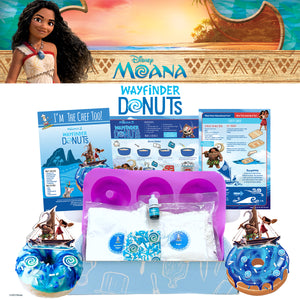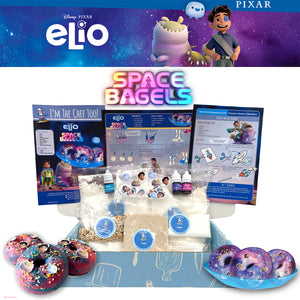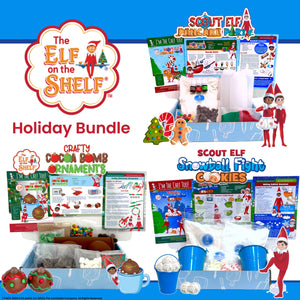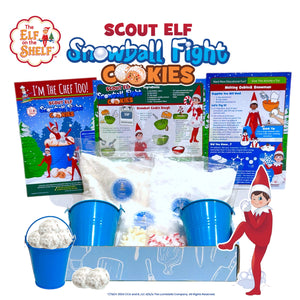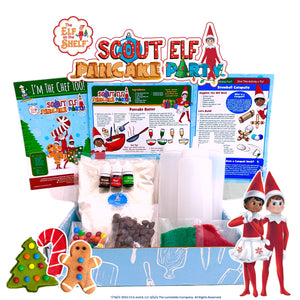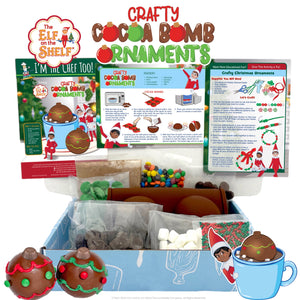Creative STEM with Recycled Materials for Kids!

Table of Contents
- Introduction
- Why Recycled Materials Are STEM Superstars
- The "Recycling Bin" Essentials: What to Save
- Getting Started: Setting Up Your Home STEM Lab
- Fantastic STEM Activities with Recycled Materials
- The Educational Impact: Beyond the Fun
- Integrating Recycled STEM with I'm the Chef Too! Values
- Taking the Next Step: More Structured STEM Adventures
- Conclusion
- FAQ: Your Questions About Recycled STEM Activities Answered
Imagine this: you've just emptied the cereal box, finished the last drop of milk, and the toilet paper roll is finally done. What do you do with these everyday items? For many of us, they head straight to the recycling bin. But what if we told you that your recycling bin isn't just a collection point for discarded items, but a treasure trove of untapped potential for incredible learning adventures right in your own home? It’s true! These humble household items hold the key to sparking curiosity, fostering creativity, and building essential problem-solving skills in children through engaging STEM activities.
Introduction
In a world increasingly focused on digital screens, finding meaningful, hands-on activities for children can feel like a challenge. Parents and educators are constantly seeking ways to engage young minds, cultivate a love for learning, and prepare them for future challenges. That's where the magic of "trash to treasure" comes into play! Far from requiring expensive kits or specialized equipment, many of the most impactful Science, Technology, Engineering, and Math (STEM) experiences can be crafted directly from the materials you already have. This post will guide you through the exciting world of STEM activities with recycled materials, offering practical ideas, tips for getting started, and a deep dive into the profound educational benefits these eco-friendly projects offer. We believe that learning should be an adventure, filled with wonder and discovery, and using recycled materials is a fantastic way to make that happen. At I'm the Chef Too!, our mission is to blend food, STEM, and the arts into one-of-a-kind "edutainment" experiences, proving that complex subjects can be taught through tangible, hands-on, and utterly delicious adventures. This same spirit of innovative, accessible learning is at the heart of recycled STEM. Get ready to transform your recycling pile into a launchpad for imagination and discovery!
Why Recycled Materials Are STEM Superstars
Before we dive into specific projects, let's explore why incorporating recycled materials into your STEM activities is such a brilliant idea. It goes far beyond simply being "frugal" or "inexpensive" – though those benefits are certainly a bonus! Using recycled items offers a unique blend of educational, environmental, and developmental advantages that make them truly exceptional tools for learning.
Accessibility and Cost-Effectiveness
One of the most immediate benefits of choosing recycled materials for STEM projects is their widespread availability and minimal cost. Almost every household generates a steady supply of cardboard, plastic, and paper waste. This means that exciting learning opportunities are literally at your fingertips, without requiring a trip to the craft store or a significant investment. This accessibility ensures that all children, regardless of socioeconomic background, can have an awesome STEM experience. It democratizes STEM education, making it an inclusive and readily available resource for every family.
Environmental Consciousness and Stewardship
In an era where environmental awareness is more crucial than ever, incorporating recycled materials into learning activities provides a tangible way to teach children about sustainability. It reinforces the vital "Reduce, Reuse, Recycle" mantra by demonstrating its practical application. When children actively transform what was once considered waste into something new and useful, they develop a deeper understanding of conservation and their role in protecting our planet. These hands-on experiences instill a sense of responsibility and empower them to make eco-friendly choices in their daily lives. We can talk about recycling, but actively turning an empty milk jug into a rain gauge truly brings the concept to life.
Unleashing Creativity and Innovation
Unlike pre-packaged kits with rigid instructions, recycled materials offer boundless possibilities. There's no "right" way to use an empty paper towel roll or a cardboard box. This open-ended nature sparks incredible creativity and encourages children to "think outside the box." They are challenged to look at ordinary objects in extraordinary ways, imagining new functions and forms. This iterative process of ideation, experimentation, and refinement is at the core of innovation, helping children develop flexible thinking and problem-solving skills that are invaluable in all aspects of life.
Fostering Problem-Solving and Adaptability
When working with recycled materials, children often encounter unexpected challenges. A cardboard tube might not be strong enough, a plastic bottle might not hold water as expected, or a design might collapse. These aren't failures; they're opportunities for learning! Kids learn to troubleshoot, adapt their plans, and iterate on their designs. This hands-on problem-solving builds resilience and teaches them that obstacles are simply invitations for creative solutions. They learn to embrace trial and error, a fundamental aspect of scientific discovery and engineering design.
Tangible, Hands-On Learning
At I'm the Chef Too!, we firmly believe in the power of hands-on learning, and recycled STEM embodies this philosophy perfectly. Children learn best by doing, touching, manipulating, and seeing how things work in the real world. Recycled materials provide a rich sensory experience and allow children to directly engage with scientific principles and engineering concepts. Building a bridge out of newspaper, for example, makes the concepts of tension and compression far more concrete than simply reading about them in a book. This tangible engagement deepens understanding and makes learning memorable and fun. This is why we are committed to sparking curiosity and creativity in children, facilitating family bonding, and providing a screen-free educational alternative through our unique cooking adventures.
The "Recycling Bin" Essentials: What to Save
Ready to start your recycled STEM adventure? The first step is to become a savvy collector! Instead of tossing everything into the curbside bin, consider setting aside a designated "STEM materials" bin. Here's a list of common household recyclables that are absolute goldmines for science, technology, engineering, and math projects, along with some non-recycled essentials that will come in handy:
Paper & Cardboard Treasures
These are the workhorses of recycled STEM. They're versatile, easy to cut, fold, and glue, and provide endless structural possibilities.
- Cardboard Boxes: Cereal boxes, tissue boxes, shoe boxes, large delivery boxes. These are fantastic for building structures, robots, or even elaborate marble runs.
- Paper Towel & Toilet Paper Rolls: Perfect for tubes, connectors, and structural supports. Think periscopes, binoculars, or even simple machines.
- Newspaper & Magazines: Excellent for building lightweight structures, paper mache, or crumpled for cushioning.
- Scrap Paper: From printer paper to old drawings, great for quick engineering challenges or adding details.
- Paper Bags: Can be cut, folded, or filled for various challenges.
Plastic Potentials
Plastics offer transparency, rigidity, and water resistance, opening up different types of experiments.
- Plastic Bottles: Water bottles, soda bottles, milk jugs. Ideal for fluid dynamics experiments, greenhouses, or water filters.
- Plastic Containers: Yogurt containers, berry containers. Can be used as bases, scoops, or measurement tools.
- Plastic Eggs: Leftover from holidays, great for buoyancy experiments or small enclosures.
Metal Marvels
While less common, certain metal items can add unique properties to your projects.
- Aluminum Cans (clean and with smooth edges): Great for demonstrating pressure, simple machines, or even crafting. Always ensure edges are safe for children.
- Old CDs/DVDs: Their reflective surface makes them perfect for light experiments or as wheels for vehicles.
Odds & Ends and Essential Tools
Don't overlook the smaller, seemingly insignificant items! These often become crucial components in creative builds. And remember to have a basic set of craft tools on hand.
- Bottle Caps: Excellent as wheels, connectors, or counters.
- Bubble Wrap & Packing Peanuts: Provide cushioning, can be used for texture, or as floating devices.
- Dryer Lint: Surprisingly useful for eco-friendly gardening or paper-making.
- Craft Sticks (Popsicle Sticks): While not recycled, they're often found in the home and are fantastic for building sturdy structures or levers.
- Pipe Cleaners, Rubber Bands, String/Yarn: Essential for attaching, connecting, and creating tension or elasticity.
-
Basic Craft Supplies:
- Scissors: For cutting paper and cardboard.
- Glue & Tape: For joining materials securely. Colored craft tape can add visual appeal and extra reinforcement.
- Markers & Pencils: For planning, drawing, and decorating.
- Rulers & Measuring Tape: For practicing measurement and precision.
- Play Dough & Toothpicks: Great for creating flexible joints or models.
- Pompoms: For adding details or testing ramps.
By setting up a designated "recycled goods bin" alongside a "non-recycled goods bin" for these basic craft supplies, you’ll always be ready for spontaneous STEM adventures.
Getting Started: Setting Up Your Home STEM Lab
You've gathered your materials – now what? Turning your home into a dynamic STEM lab doesn't require a dedicated room; a corner of the kitchen table or a cleared spot on the floor can become a "Tinker Station" or "Inventor Supply Lab." The key is creating an inviting environment that encourages exploration and experimentation.
Dedicated Space and Organization
Designate a specific area for your recycled materials and tools. This could be a large bin, a stack of clearly labeled boxes, or a corner shelf. Good organization makes it easier for kids to find what they need and encourages them to put things away, fostering a sense of responsibility. Having a "recycled goods bin" and a "non-recycled goods bin" helps streamline the process.
Safety First
While recycled materials are generally safe, adult supervision is always key, especially when sharp objects like scissors or craft knives are involved. Ensure that any cans have smooth, non-sharp edges. Teach children how to use tools properly and emphasize cleaning up any small pieces that could be choking hazards for younger siblings.
Brainstorming and Empowering Your Child
Before diving into a project, have a brainstorming session! Instead of immediately dictating what to build, ask open-ended questions:
- "What can we make out of these materials?"
- "How can we solve a problem using recycling?"
- "What do these materials remind you of?"
Encourage creativity and critical thinking. Let your child lead the ideation process. This not only makes the activity more engaging for them but also builds their problem-solving muscles from the ground up. You're there to guide and support, not to provide all the answers. Remember, the goal isn't always a perfect outcome, but the process of discovery and learning. For a deeper dive into structured educational play, remember that every I'm the Chef Too! kit provides full instructions with sample images, activity-specific instruction sheets, and even data collection sheets and questions for reflection, offering a more guided yet equally engaging learning experience. If you’re looking for a convenient way to bring these learning adventures home monthly, consider that a new adventure is delivered to your door every month with free shipping in the US when you Join The Chef's Club.
Fantastic STEM Activities with Recycled Materials
Now for the fun part! Here are a plethora of engaging STEM activities you can undertake with your child, categorized by the core STEM discipline they primarily explore. Many projects, of course, naturally blend multiple disciplines!
Engineering Marvels: Building & Structures
Engineering is all about design, construction, and problem-solving. Recycled materials are perfect for hands-on engineering challenges.
Cardboard & Paper Challenges
- Paper Tower Challenge: Challenge kids to build the tallest freestanding tower using only paper (like old newspapers or scrap 8.5x11-inch sheets) and a small amount of tape or glue. This teaches about stability, base strength, and geometric shapes for support. What shapes are strongest? How can you make the paper more rigid?
- Paper Bridge Challenge: Provide a "gap" (e.g., between two chairs or books) and challenge children to build a bridge strong enough to hold a specific weight (e.g., a toy car, a book) using only paper. Explore different bridge types – a simple beam, an arch, or a truss bridge. This introduces concepts like load bearing, tension, and compression.
- Paper Chain Challenge: Who can make the longest chain from a single sheet of paper? This simple challenge introduces concepts of measurement, estimation, and material properties. It’s also a great icebreaker or quick challenge for groups.
- Walk Through Paper Challenge: Can you cut a hole in a single piece of paper large enough for a person to walk through? This mind-bending puzzle explores geometry and spatial reasoning in a surprising way.
- Cardboard Marble Runs/Roller Coasters: Collect cardboard tubes (toilet paper, paper towel, gift wrap) and cardboard boxes. Design and build intricate pathways for marbles to roll down. This teaches about gravity, friction, momentum, and the engineering design process (planning, building, testing, refining). How tall can they make their marble roller coaster?
- DIY Hand Crank Winch: Using a cardboard box, a pencil or dowel, and string, kids can create a simple winch. This demonstrates how simple machines can multiply force and change the direction of motion, exploring levers and gears.
- Cardboard Rocket Ship or Droid: Unleash imagination by building large-scale creations from big cardboard boxes. Kids can design their own space vehicles, robots, or futuristic homes, integrating elements of structure, aesthetics, and imaginative play.
- Homemade Cardboard Construction Set: Cut cardboard into various shapes (strips, squares, circles) and create slots or holes for them to interlock. This allows for open-ended construction, exploring modular design and spatial relationships, similar to building blocks but with recycled materials.
Plastic Bottle & Can Creations
- DIY Plastic Bottle Greenhouse: Use a large plastic bottle (like a 2-liter soda bottle) to create a mini-greenhouse. Cut it in half, add soil and seeds, and cover it. This introduces basic plant science, the water cycle (condensation), and the concept of creating a controlled environment for growth.
- Water Filter Engineering Project: Layer different recycled materials like cut-up plastic bottles, fabric scraps, gravel, sand, and charcoal (if available) to create a simple water filter. Experiment with filtering muddy water. This teaches about purification, permeable vs. impermeable materials, and basic fluid mechanics.
- DIY Rain Gauge or Water Clock: Use a straight-sided plastic bottle and a ruler to create a rain gauge for outdoor observations of precipitation. Or, for a water clock, punch a tiny hole in the bottom of a bottle, mark intervals, and time how long it takes for the water level to drop, exploring consistent rates of flow. Both foster observation and measurement skills.
- Crushing Can Experiment: A simple yet dramatic demonstration of air pressure. Place a small amount of water in an aluminum can, heat it gently until steam appears, then quickly invert it into a bowl of cold water. The sudden cooling creates a vacuum, crushing the can. (Adult supervision is critical here). This vividly illustrates atmospheric pressure.
- DIY Phone Speaker: Recycle a cardboard tube (like a paper towel roll) and some paper cups. Cut slots in the tube for a phone to sit, and attach paper cups to the ends. This simple engineering project demonstrates how sound waves can be amplified and directed, exploring acoustics and basic wave properties.
Physics Fun: Motion & Energy
Explore the principles of motion, force, and energy transfer with these dynamic projects.
- Balloon Cars: Transform a plastic bottle or cardboard box into a car, add bottle caps for wheels, and power it with an inflated balloon taped to the back. This teaches about propulsion (Newton's Third Law), friction, and aerodynamics. Kids can experiment with different balloon sizes or car designs to see which goes farthest.
- Wind-Powered Cars: Using lightweight recycled materials like cardboard, plastic straws, and bottle caps, design and build a car that can be propelled by wind (e.g., from a fan or a child blowing). This explores wind energy, sail design, and aerodynamics.
- Easy Upcycled Catapult: Using craft sticks (recycled if you have old ones!), rubber bands, and a plastic bottle cap for the basket, build a simple catapult. This demonstrates levers, force, trajectory, and potential/kinetic energy. Experiment with different "ammunition" (pompoms, crumpled paper) to see how far they fly.
- Recycled DIY Can Telephones: Connect two clean, empty tin cans with a long piece of string. When taut, children can speak into one can, and the vibrations travel along the string to be heard in the other. This classic experiment illustrates how sound travels through vibrations and how materials can transmit sound.
- DIY Solar Oven/Cooker: Using a pizza box or a large cardboard box lined with aluminum foil and black construction paper, create a simple solar oven. On a sunny day, try melting s'mores or warming a small piece of chocolate. This introduces concepts of solar energy, heat absorption, and insulation. No campfire needed for this engineering classic!
Chemistry & Life Science Explorations
Recycled materials can provide the containers and components for fascinating chemical reactions and biological observations.
- Erupting Volcano: While the classic baking soda and vinegar reaction is the core, use a plastic bottle or molded newspaper and cardboard as the volcano structure. Observing a chemical reaction that makes our Erupting Volcano Cakes bubble over with deliciousness in our kits is always a favorite, and a homemade version with recycled materials offers a similar wow factor! It's a great introduction to acids, bases, and gas production.
- Melting Crayons: Collect old crayon bits and melt them in recycled plastic egg cartons or silicone molds placed on a baking sheet. This explores states of matter (solid to liquid) and the effects of heat.
- Recycled Paper Making: Blend old scrap paper with water to create a pulp, then press and dry it on a screen to make new recycled paper. This teaches about sustainability, fiber science, and the process of recycling. It’s also good for the environment and a truly hands-on craft!
- Repurpose Dryer Lint for Gardening: Dryer lint, being mostly cotton fibers, can be mixed with soil to improve drainage or even used as a seed-starting medium. This introduces concepts of composting, soil composition, and sustainable gardening practices.
Art & Technology Integration (STEAM)
Many recycled STEM projects naturally incorporate art, making them STEAM (Science, Technology, Engineering, Art, Math) activities.
- DIY Kaleidoscope: Using a paper towel tube, small mirrors (or shiny foil), and clear plastic from a recycled container (like a strawberry punnet), create a kaleidoscope. This teaches about light reflection, symmetry, and patterns.
- Pinhole Camera: Using a cardboard box, aluminum foil, and tracing paper, construct a simple pinhole camera. Observe how light travels in straight lines and how an inverted image is formed. This is a fascinating introduction to optics and the fundamentals of photography.
- Recycled Plastic Flowers: Cut decorative shapes from colorful plastic bottles and heat them slightly (with adult supervision!) to create beautiful, unique plastic flowers. This combines art with material science and repurposing.
- DIY Kid-Made Abacus: Use a shoebox or cardboard, pipe cleaners, and recycled bottle caps or beads to create a functional abacus. This integrates math skills with fine motor development and creative construction.
- Trash Tower Challenge: Give children a variety of mixed recycled materials (cardboard, plastic, paper) and challenge them to build the tallest, most stable, or most creative "trash tower." This is an open-ended engineering design challenge that prioritizes creativity and resourcefulness.
- Edible Creations with Recycled Themes: While I'm the Chef Too! specializes in delicious, hands-on cooking adventures, you can sometimes bring a "recycled" theme to your edible projects. For example, our Peppa Pig Muddy Puddle Cookie Pies might not use recycled materials in the literal sense, but they tie into imaginative play and themed learning, showing how everyday items (like mud puddles!) can inspire creative projects. Or explore astronomy by creating your own edible solar system with our Galaxy Donut Kit, where the "recycled" aspect is the transformation of simple ingredients into a complex model!
These are just a handful of ideas to get you started. The beauty of recycled STEM is that the possibilities are truly limitless, bounded only by imagination!
The Educational Impact: Beyond the Fun
While the immediate joy and engagement of STEM activities with recycled materials are clear, the long-term educational benefits are even more profound. These seemingly simple projects are powerful catalysts for developing critical skills and mindsets that extend far beyond the craft table.
Fostering the Engineering Design Process
Many recycled STEM challenges naturally guide children through the engineering design process:
- Ask: What's the problem? What do we need to create?
- Imagine: Brainstorm ideas, draw sketches.
- Plan: Choose the best idea, list materials.
- Create: Build the prototype.
- Improve: Test it, identify flaws, and make it better.
This iterative approach teaches children that "failure" is simply a step towards improvement and that perseverance is key to innovation.
Developing Critical Thinking & Problem-Solving
When a bridge collapses or a car won't roll, children are prompted to analyze what went wrong and devise new strategies. This hands-on troubleshooting cultivates critical thinking, logical reasoning, and adaptability. They learn to break down complex problems into smaller, manageable parts and to think creatively to find solutions.
Encouraging Collaboration & Communication
Many recycled STEM projects are ideal for group work. Whether it's a sibling duo or a small group of friends, working together on a challenge fosters communication, negotiation, and teamwork skills. They learn to share ideas, divide tasks, and support each other, mimicking real-world collaborative environments.
Building Confidence & Resilience
Successfully completing a self-designed project, even a simple one, gives children an immense sense of accomplishment. Overcoming challenges and seeing their ideas come to life builds confidence in their abilities and fosters a "can-do" attitude. This resilience, the ability to bounce back from setbacks, is a crucial life skill.
Promoting Environmental Stewardship
Beyond the immediate act of recycling, these activities instil a deeper appreciation for resources and the environment. Children learn to value materials and understand the impact of waste, becoming more mindful consumers and advocates for sustainable practices.
Screen-Free Engagement
In today's digital landscape, providing screen-free educational alternatives is a priority for many families. Recycled STEM activities offer a fantastic way to engage children's minds and hands without relying on screens, promoting healthy habits and genuine interaction with their physical environment. This commitment to screen-free, hands-on learning is a core value at I'm the Chef Too!, as we strive to create experiences that foster genuine connection and discovery.
Facilitating Family Bonding
Working on a recycled STEM project together is a wonderful way to create joyful family memories. It provides a shared goal, sparks conversations, and allows parents to model enthusiasm for learning and problem-solving. These shared experiences strengthen family bonds and create lasting impressions.
Integrating Recycled STEM with I'm the Chef Too! Values
At I'm the Chef Too!, our mission is deeply rooted in sparking curiosity and creativity in children by blending food, STEM, and the arts into unique "edutainment" experiences. The principles behind successful STEM activities with recycled materials align perfectly with our educational philosophy. We believe that learning should be engaging, hands-on, and accessible, whether it's through crafting a rocket from a cardboard tube or baking a cake that erupts like a volcano.
Our approach, developed by mothers and educators, emphasizes that complex subjects can be simplified and made exciting through tangible, hands-on adventures. This is precisely what recycled STEM projects achieve – they transform abstract concepts into concrete, playful explorations. Just as we use delicious recipes to teach about chemistry, measurement, and engineering, recycled materials use everyday objects to illustrate scientific principles and design challenges.
While recycled STEM thrives on open-ended creativity and using readily available items, we understand that busy families sometimes need a more convenient, pre-prepared option for engaging STEM fun. That's where I'm the Chef Too! steps in. Our kits offer the perfect complement to your at-home recycled adventures, providing all the pre-measured dry ingredients and specialty supplies needed for a complete, themed experience. Imagine a weekend where you combine the free-form joy of building a cardboard fort with the structured excitement of baking a batch of cookies that teach about geology, like our Fudgy Fossil Dig kit. Both approaches foster a love for learning, build confidence, and create memorable family moments.
Whether you're diving into your recycling bin for an impromptu engineering challenge or unwrapping a new themed kit from us, the goal remains the same: to ignite that spark of discovery in your child. Our unique approach ensures that learning is always delicious, always engaging, and always an adventure. If you're looking for ongoing, convenient STEM adventures delivered right to your door, we invite you to explore the benefits of The Chef's Club subscription. It’s perfect for families who want consistent, high-quality educational fun without the hassle of gathering specialized ingredients or supplies.
Taking the Next Step: More Structured STEM Adventures
You've seen how much fun and learning can spring from your recycling bin. The world of STEM activities with recycled materials is truly boundless, encouraging incredible ingenuity and environmental awareness. But what happens when you're short on time, need a specific theme, or want a more guided experience with perfectly portioned ingredients and unique tools?
That's where I'm the Chef Too! comes in to bridge the gap between spontaneous creativity and curated educational adventures. We take the hassle out of planning by delivering complete experiences right to your door, blending the joy of cooking with fascinating STEM and art concepts. Our kits come with pre-measured dry ingredients and specialty supplies, making it easy to dive into a new learning theme without any prep work.
Imagine exploring states of matter while baking colorful "Northern Lights" cupcakes, or understanding chemical reactions as you craft delectable "Dinosaur Egg" bath bombs. Our kits offer a unique way to dive deep into subjects like geology with our Erupting Volcano Cakes or astronomy with our Galaxy Donut Kit, all while creating something delicious and memorable. These are experiences designed by mothers and educators to spark curiosity, facilitate family bonding, and provide a screen-free educational alternative.
Whether you're complementing your home-grown recycled STEM efforts or looking for a convenient way to introduce new topics, our kits provide a structured yet incredibly fun pathway to learning. You can explore our full library of adventure kits available for a single purchase by browsing our complete collection of one-time kits.
For ongoing adventures and consistent learning opportunities, our monthly subscription, The Chef's Club, delivers a new experience right to your door with free shipping in the US. It’s a convenient, flexible, and value-packed way to ensure your child always has a new, exciting "edutainment" project to look forward to. You can choose from 3, 6, or 12-month pre-paid plans, perfect for gifting or ensuring long-term enrichment.
And for educators or group leaders, our school and group programs offer flexible options, even with or without food components, making our unique blend of STEM, food, and arts accessible to classrooms, camps, and homeschool co-ops. Bring our hands-on STEM adventures to your learning environment! Learn more about our versatile programs for schools and groups.
Conclusion
The journey into STEM activities with recycled materials is an exciting and accessible path for every family. It's a testament to the fact that profound learning doesn't require expensive gadgets or complex setups; often, the greatest discoveries begin with the most humble materials right in your recycling bin. From simple paper towers to elaborate cardboard robots, these projects ignite creativity, cultivate critical thinking, and instill a deep appreciation for our planet.
By embracing the "Reduce, Reuse, Recycle" philosophy in your playtime, you're not just keeping materials out of landfills; you're building a foundation for lifelong learning, problem-solving, and environmental consciousness in your children. You’re empowering them to be innovators, thinkers, and conscious citizens of the world. And most importantly, you're creating cherished moments of family bonding, learning, and discovery.
At I'm the Chef Too!, we are passionate about making STEM education engaging, accessible, and fun. Whether you're gathering household "treasures" for a DIY project or unboxing one of our curated "edutainment" kits, we believe every child deserves the chance to explore, experiment, and discover the wonders of science, technology, engineering, and math.
Ready to embark on an endless adventure of learning and creativity? Make sure the fun and learning never stop. Join The Chef's Club today and get a new, exciting STEM cooking kit delivered to your door every month, complete with everything you need for a delicious and educational experience!
FAQ: Your Questions About Recycled STEM Activities Answered
Q1: What age group are recycled STEM activities best for?
Recycled STEM activities are incredibly versatile and can be adapted for a wide range of ages, from toddlers to teenagers. For younger children (3-6), focus on open-ended exploration, sensory play, and simple building challenges (like stacking boxes or making paper chains) with plenty of adult supervision. For elementary school children (7-12), you can introduce more complex engineering challenges like building marble runs, bridges, or designing simple machines. Teenagers can tackle more intricate projects, delve deeper into the scientific principles behind their creations, and even design experiments to test variables. The beauty is in scaling the challenge to the child's developmental level and interest.
Q2: Do I need special tools for recycled STEM projects?
Not at all! One of the best aspects of STEM activities with recycled materials is their accessibility. Most projects require only basic household tools like scissors, glue, tape, markers, and maybe a ruler. Sometimes a craft knife might be useful for cutting thick cardboard (always for adult use only!), but generally, kid-friendly scissors and strong adhesive will suffice. The emphasis is on using what you have, encouraging resourcefulness, and "thinking outside the box" when it comes to materials.
Q3: How do I ensure safety when using recycled materials?
Safety is paramount. Here are a few key tips:
- Adult Supervision: Always supervise children, especially when they are using scissors or working with potentially sharp edges.
- Clean Materials: Ensure all recycled materials (e.g., milk jugs, food containers, aluminum cans) are thoroughly cleaned and dry to prevent mold or odors.
- Safe Edges: If using tin cans, ensure the edges are smooth and rolled inward, or cover them with tape to prevent cuts. Avoid broken glass or sharp plastic.
- Non-Toxic Adhesives: Use child-safe glue and tape.
- Choking Hazards: Be mindful of small pieces (like bottle caps or tiny plastic bits) that could be choking hazards for very young children.
Q4: How can I make recycled STEM activities more challenging for older kids?
For older children, elevate the challenge by:
- Adding Constraints: Give them a specific problem to solve (e.g., "Build a car that can carry 5 pounds" or "Design a filtering system for muddy water") or limit the materials they can use.
- Integrating Measurement & Data: Encourage them to measure, record data, and analyze results. How far did the car go? How much weight did the bridge hold?
- Research & Design Process: Have them research real-world examples (e.g., different types of bridges, how solar panels work) and formally plan their designs before building.
- Reflection & Improvement: Ask them to reflect on what worked, what didn't, and how they would improve their design if they had to do it again.
- Interdisciplinary Connections: Challenge them to incorporate elements of art, writing, or coding into their projects.
Q5: What if I don't have many recycled materials on hand?
Don't worry! Start by saving just a few common items like cardboard boxes and paper towel rolls – you'll be surprised how quickly they accumulate. You can also:
- Ask Friends and Family: Let neighbors, friends, or family know you're collecting specific items for STEM projects.
- Local Businesses: Small shops or cafes might be willing to save cardboard or plastic containers for you.
- Community Groups: Connect with local schools or community centers; they often have recycling drives or "makerspace" bins. Remember, even a small collection can spark a huge amount of creativity. And for those times you want a completely hassle-free, themed experience, don't forget that I'm the Chef Too! offers a wide array of single-purchase kits that come with all the specialized ingredients and supplies you need for a new STEM adventure!


